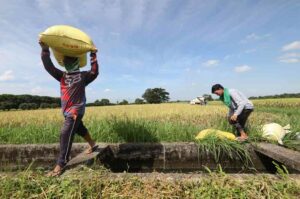By Adrian H. Halili, Reporter
THE Department of Agriculture (DA) needs to increase investment in research and development to make the Philippines self-sufficient in food.
“Invest in research and development as well as extension (RDE). This is often underinvested in, but we must do so as RDE is the means by which we improve productivity,” Geny F. Lapina, an agricultural economist at the Department of Agricultural and Applied Economics at the University of the Philippines Los Baños, said in an e-mail interview.
As domestic production cannot meet demand, the Philippines typically imports commodities like rice, meat, sugar, and dairy, among others.
“What needs to be improved is execution, monitoring, and strategic thinking. Much of what we do still leans more towards what is popular,” Mr. Lapina added.
He said that the effects of climate change on agricultural production warrants constant monitoring and evaluation of ongoing farm programs.
Droughts and dry spells, mainly due to El Niño, caused a drop in agricultural production during the first half of the year.
“In general, food will always be political. We need more leaders that can think strategically and rally the various competing interests in the food and agriculture sector,” he added.
He said that the Agriculture department remains subject to pressure from farmers and consumers.
“If they focus on consumers that translates to lower retail prices, then farmers complain. However, if they focus on producers and farmgate prices go up, then consumers complain,” Mr. Lapina added.
He said that too much of a burden is placed on the DA in terms of achieving food security.
He called for a “whole of government approach” in the various departments dealing with technology, infrastructure, trade policy, environment, and human health.
Mr. Lapina said food security has now become a much more complex challenge.
He added that nutrition should be part of the food security discussion, “given the rise of non-communicable diseases where the food we eat is one contributing factor.”
“There is also increasing recognition of the impact of food production on the environment,” he said.

